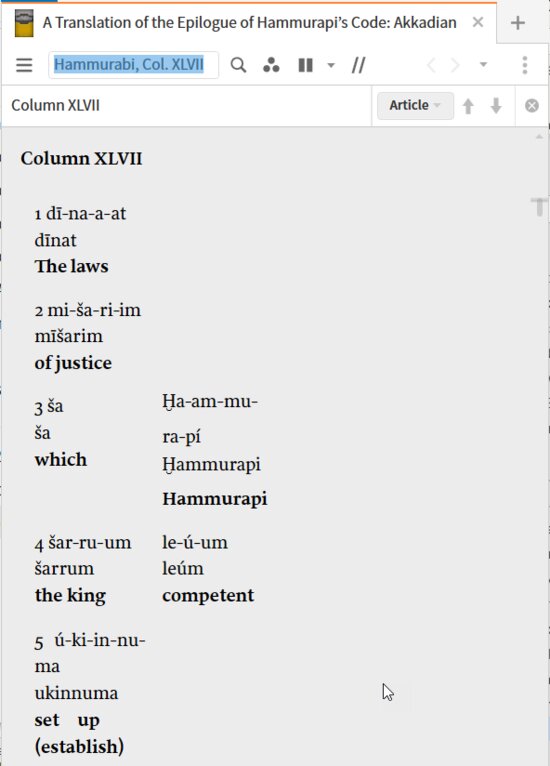Docx files for personal book: Verbum 9 part 1; Verbum 9 part 2; Verbum 9 part 3; Verbum 9 part 4; How to use the Verbum Lectionary and Missal; Verbum 8 tips 1-30; Verbum 8 tips 31-49
Reading lists: Catholic Bible Interpretation
Please be generous with your additional details, corrections, suggestions, and other feedback. This is being built in a .docx file for a PBB which will be shared periodically.
Previous post: Verbum Tip 6g Next post: Verbum Tip 6i
Aside: Tense Voice Mood
Resources using Pierce, Larry. Tense Voice Mood. Bellingham, WA: Logos Bible Software, n.d. include:
- Sociedade Bíblica do Brasil. Almeida Revista E Atualizada, Com Números de Strong. Sociedade Bíblica do Brasil, 2003.
- Robinson, Maurice. Elzevir Textus Receptus (1624): With Morphology. Bellingham, WA: Logos Bible Software, 2002.
- The Holy Bible: King James Version. Electronic ed. of the 1769 edition of the 1611 Authorized Version. Bellingham WA: Logos Research Systems, Inc., 1995.
- Newberry, Thomas, and George Ricker Berry. The Interlinear Literal Translation of the Greek New Testament. Bellingham, WA: Logos Bible Software, 2004.
- The New Testament in the Original Greek: Byzantine Textform 2005, with Morphology. Bellingham, WA: Logos Bible Software, 2006.
- Scrivener’s Textus Receptus (1894): With Morphology. Bellingham, WA: Logos Bible Software, 2002.
- Stephen’s 1550 Textus Receptus: With Morphology. Bellingham, WA: Logos Bible Software, 2002.
- Westcott and Hort Greek New Testament (1881): With Morphology. Bellingham, WA: Logos Bible Software, 2002.
Note that the latest of these resources is dated 2006 and that the TVM resource is no longer available – a rather odd choice as the codes are still in use in user libraries. However, the TVM number still appears in the AV gutter line popup. A search on <TenseVoiceMood = TVM5719> should produce the list for your library.
Targum Onqelos to the Pentateuch and several other CAL resources
A number of the Comprehensive Aramaic Lexicon resources use the interlinear mechanism to show variants – something more commonly seen in in apparatus.
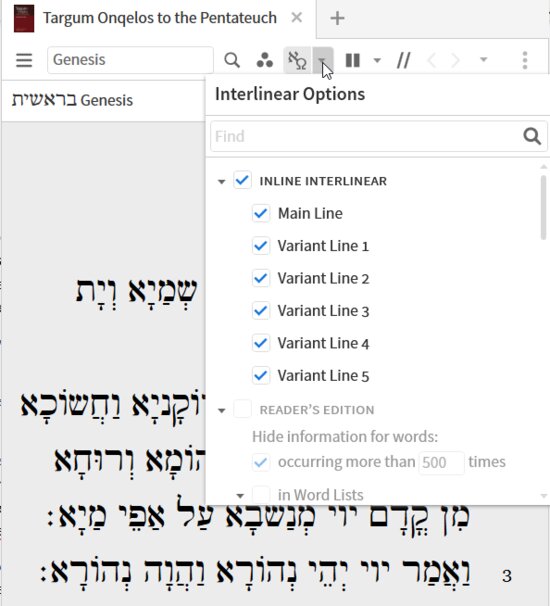
Lexham Hebrew Bible (Qere-Ketiv forms)
- The Lexham Hebrew Bible. Bellingham, WA: Lexham Press, 2012.
- Biblia Hebraica Stuttgartensia: SESB Version. Electronic ed. Stuttgart: German Bible Society, 2003.
- Biblia Hebraica Westmonasteriensis with Westminster Hebrew Morphology 4.18. J. Alan Groves Center for Advanced Biblical Research, 2013.
For an introduction to Qere and Ketiv see Wikipedia.
Definitions from the Search Fields section of the Information Panel of The Lexham Hebrew Bible.
Kethiv Text
The text of the Hebrew Bible that is written when it differs from the text to be read.
Qere Text
The text of the Hebrew Bible that is to be read when it differs from the text that was written.

The Parallel Aligned Hebrew-Aramaic and Greek Texts of Jewish Scripture and variants
Tov’s interlinear are geared towards the study of the Hebrew text behind the Septuagint.
- Tov, Emanuel. The Parallel Aligned Hebrew-Aramaic and Greek Texts of Jewish Scripture. Bellingham, WA: Lexham Press, 2003.
- Tov, Emanuel, Computer Assisted Tools for Septuagint Studies. The Parallel Aligned Hebrew-Aramaic and Greek Texts of Jewish Scripture - Alexandrinus and Theodotion Variants. Bellingham, WA: Lexham Press, 2003.
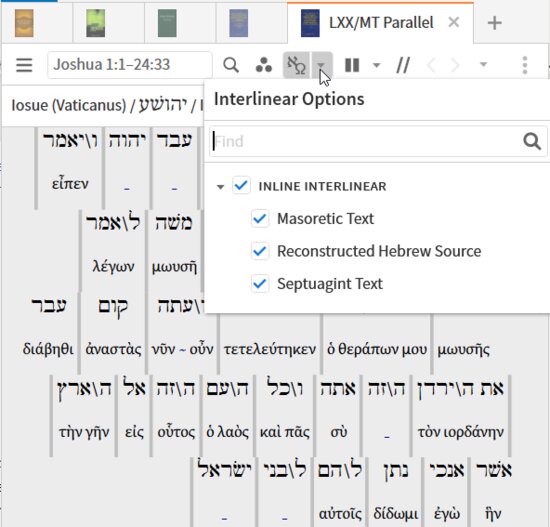
Biblia Hebraica transcripta
This volume which uses a non-traditional transcription, uses the interlinear to display the manuscript text.
- Richter, Wolfgang, Christian Riepl, and Johann Peter Rechenmacher. Biblia Hebraica Transcripta. Bellingham, WA: Lexham Press, 2016.
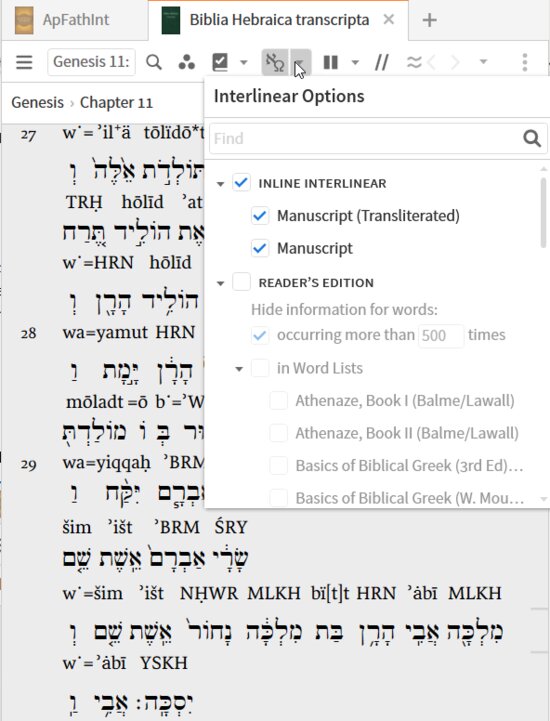
Apostolic Fathers Greek-English Interlinear
These interlinears are non-standard in the sense that their texts are primarily non-canonical.
- Brannan, Rick. “Apostolic Fathers Greek-English Interlinear.” Lexham Press, 2011.
- Lightfoot, Joseph Barber, and J. R. Harmer. “The Apostolic Fathers.” London: Macmillan and Co., 1891.
Lightfoot has a minimalist interlinear:
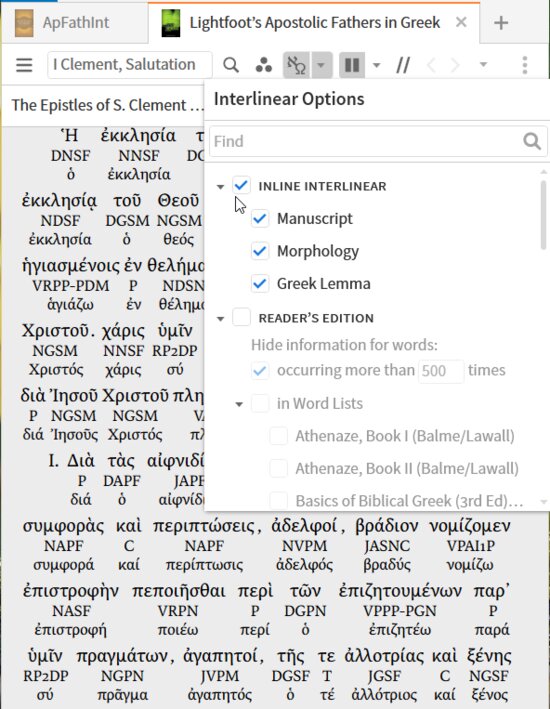
Brannan, in comparison, has the full Logos interlinear without Strong’s.
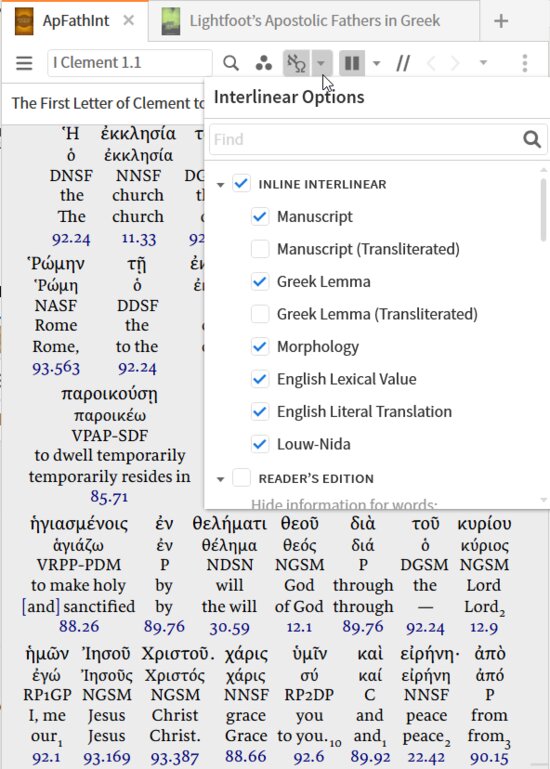
A Translation of the Epilogue of Hammurapi’s Code
This is an interesting outlier – the text is in the interlinear format but the resource does not use the interlinear Verbum tool and hence is not available from the appropriate resource panels.
- Staats, Gary. “A Translation of the Epilogue of Hammurapi’s Code: Akkadian.” In A Short Inductive Akkadian Grammar Based on the Epilogue of Hammurapi’s Code, edited by Martin Johnson and Marty Daly. Gary Staats, 2013.
